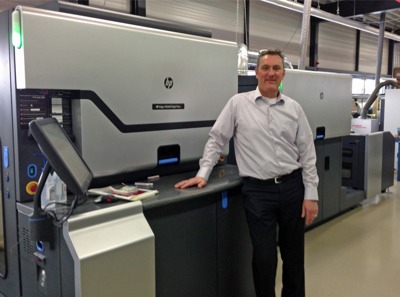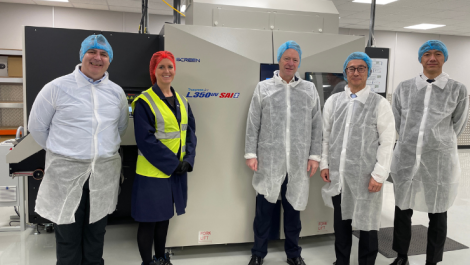Cees Schouten, technical director
Geostick BV, of the Netherlands, has installed three HP Indigo WS6600 digital presses to extend uptime and increase productivity to meet the demands of the label market.
All of the new presses include the In-Line Priming (ILP) option, which uses a water-based primer to treat standard paper and also synthetic substrates. This was a particular selling point for the company as it helps reduce turnaround times by eliminating the extra step of off-line substrate preparation
‘We had three HP Indigo WS6000 digital presses, which we were very pleased with, but we were ready to upgrade and the obvious choice was the WS6600,’ said Cees Schouten, technical director. ‘Previously, we were priming everything off-line, but knew that inline priming would be much more efficient and enable us to lower costs, so we chose to have this feature on the presses. We can do more in the same amount of time, which means we can offer our customers shorter turnaround times.’
Geostick was impressed with the short setup time of the press and also its ability to print on substrates from 12 to 450 microns including paper and plastic. Mr Schouten described it as a versatile, highly productive offset press, ideal for printing labels for its major customers in the chemical and food industries, and labels for logistics applications that may include barcodes and QR codes that are read electronically. Also the automatic calibration on the WS6600 has improved compared to earlier models, giving the press more stability on repeat lengths.
‘One huge benefit of the HP Indigo WS6600 is that the cost of printing has been reduced, so we are spending less per square metre,’ said Mr Schouten. ‘We can pass that price reduction on to our customers to maintain our competitive edge. The press requires little or no operator intervention, so money is also saved there’.
The company wants to retain flexibility for its customers, and it is important for it to deliver high quality results quickly, and in varying run lengths, number of colours and range of substrates. Recently, it was able to take on a large project, where a customer requested 20,000 labels to be produced in 24 hours. With the new digital press, it was able to take on the work and meet the challenge. ‘More uptime on the printer means we can take on more work, but still offer quick turnaround times,’ concluded Mr Schouten. ‘We are expecting our sales to increase by more than 10% following the installation of all three presses, and we are looking forward to welcoming new customers.’



